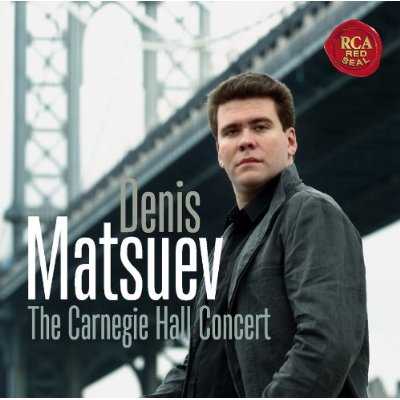
Performer: Denis Matsuev
Audio CD
SPARS Code: DDD
Number of Discs: 1
Format: APE (image+cue)
Label: RCA RED SEAL
Size: 224 MB
Recovery: +3%
Scan: yes
01. R. Schumann: Kinderszenen, Op. 15/Von Fremden Ländern Und Menschen
02. R. Schumann: Kinderszenen, Op. 15: Kuriose Geschichte
03. R. Schumann: Kinderszenen, Op. 15: Haschemann
04. R. Schumann: Kinderszenen, Op. 15: Bittendes Kind
05. R. Schumann: Kinderszenen, Op. 15/Glückes Genug
06. R. Schumann: Kinderszenen, Op. 15: Wichtige Begebenheit
07. R. Schumann: Kinderszenen, Op. 15: Träumerei
08. R. Schumann: Kinderszenen, Op. 15: Am Kamin
09. R. Schumann: Kinderszenen, Op. 15/Ritter Und Steckenpferd
10. R. Schumann: Kinderszenen, Op. 15/Fast Zu Ernst
11. R. Schumann: Kinderszenen, Op. 15: Fürchtemachen
12. R. Schumann: Kinderszenen, Op. 15/Kind Im Einschlummern
13. R. Schumann: Kinderszenen, Op. 15/Der Dichter Spricht
14. Liszt: Sonata In B Minor
15. Prokofiev: Piano Sonata No. 7 In B Flat Major, Op. 83/Allegro Inquieto
16. Prokofiev: Piano Sonata No. 7 In B Flat Major, Op. 83/Andante Caloroso
17. Prokofiev: Piano Sonata No. 7 In B Flat Major, Op. 83/Precipitato
18. Liadov: The Musical Snuff-Box
19. Scriabin: Etude In Dis-Moll, Op. 8, No. 12
20. Grieg-Ginzburg: In Der Halle Des Bergkönigs
Making a bid to be the next Kissin — and it just might work
When Evgeny Kissin made his sensational Carnegie Hall debut in 1990, the program centered on Schumann, Liszt, Chopin, and Prokofiev. Now we have another BMG/RCA artist who is also a formidable young Russian with Liszt, Schumann, and Prokofiev figuring in a Carnegie Hall recital. Can celebrity strike twice? The 34-year-old Denis Matsuev hasn’t reached anything near Kissin’s superstardom, but having heard him in concert this past sumer, I’m a believer. He doesn’t imbue every phrase with charisma as the young Kissin did so thrillingly, but in his own way Matsuev is very impressive.
Whether RCA had Kissin in mind with this program — I doubt that they did, actually — beginning with Schumann’s Kinderszenen helps to set Matsuev apart from the generic flashy keyboard whiz who are Russia’s stock in trade. He has natural, graceful musical instincts and I hope the PR campaign that tried to make him “the new Horowitz” has been scotched. Horowitz was a famous Schumann player, too, and here we have outbursts of glittering notes on occasion but without Horowitz’s ear-catching eccentricities and electricity. Matsuev is almost daringly introverted at times. Will style and grace make enough of an impression when Argerich, for one, applies more charisma in Kinderszenen? Time will tell, but this is an appealing account on its own terms, reserved and without sentimentality.
By taking up the Liszt B minor Sonata, Matsuev begs comparison with both Horowitz and Richter, two giants who made a specialty of the work, as Pollini, to some extent, does today. After a rather neutral opening statement, Matsuev makes clear that his is a symphonic interpretation, outsized, grandly eloquent, full of light and color. He charges ahead with great assurance and impervious technique (helped by excellent recorded sound and a fine piano). His fingers of capable of spectacular clarity at high speed. The overall feeling is Gilels-like; that is, we hear enormous authority first and personality second. I came away impressed. Considering the spectacular sonics, here’s a new frontrunner among recent recordings of this work, with Yuma Wang providing serious rivalry on DG.
Richter hovers over the Prokofiev sonatas like a presiding wizard, and I doubt his combination of fierceness and spontaneity will ever be equaled. Matsuev civilizes the Seventh Sonata by comparison, and again he’s Gilels-like compared to, say Pletnev, who plays Prokofiev with whimsy and originality. The sardonic element is absent here, but Matsuev doesn’t tip too far in the other direction; there’s plenty of dramatic and flashy fingerwork here. What’s impressive is how well Matsuev establishes a strong tonal center — as Gilels always did — so that nothing every sounds clangy, pingy, or crudely thunderous as Prokofiev exploits the range of the keyboard. The singing middle movement is handled quite effortlessly, without affectation. The heavy, clumped chords in the finale are powerful without being oppressive.
We get three encores: a dainty morsel from Liadov, a passionate Scriabin Etude, and a study in acceleration: a transcription for piano by the great Grigory Ginzburg of Grieg’s In the Hall of the Mountain King, which is intended to exploit the wow factor. It does. (RCA should have provided a second CD to include two time-honoredshowstoppers, Liszt’s Mephisto Waltz and Hungarian Rhapsody no. 2.)
I have no idea if Matsuev will grab the golden ring, but his gifts are enormous and will establish him at the top ranks of pianists for a long time to come.
Thanks! Nice CD!